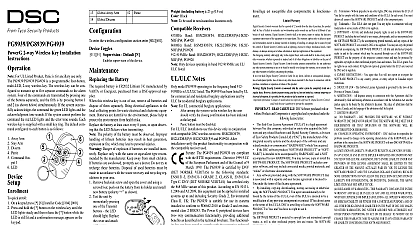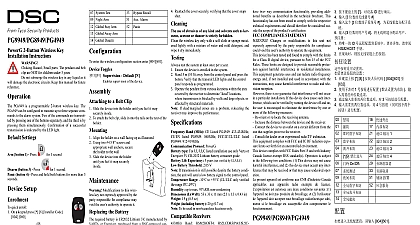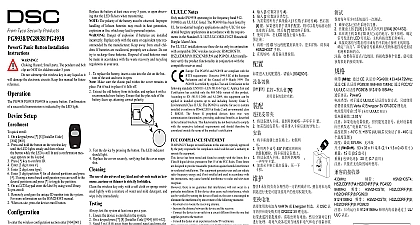DSC PG9929-PG8929-PG4929 - Wireless PG Key - Installation Manua - Eng - S-Chi - R001

File Preview
Click below to download for free
Click below to download for free
File Data
| Name | dsc-pg9929-pg8929-pg4929-wireless-pg-key-installation-manua-eng-s-chi-r001-6502987314.pdf |
|---|---|
| Type | |
| Size | 1.24 MB |
| Downloads |
Text Preview
a Series 2 way Wireless key Instructions For UL use only 2 way key The key can configured to up to five commands to the alarm system Four of the commands transmitted by pressing one of the buttons separately and fifth is by pressing button 1 and 2 as shown below Sending a command to the system causes the LED to briefly illuminate If the system successfully the command the green LED briefly lights then associated blue LED lights and the acknowledgment tone If the system cannot perform the command the red briefly lights and the error tone sounds If the wireless key is low the yellow LED blinks for 2 seconds If there is a on the system the yellow LED lights for 2 seconds If system is armed and an entry occurs the DISARM LED The default configuration of each button is as follows AWAY arm STAY arm DISARM PANIC Command Output 1 buttons 1 and 2 Message LED Status LEDs Setup quick enroll On a keypad press 8 Installer Code 804 000 Press and hold the button on the wireless key until the lights steady and then release the button while the is still lit and a confirmation message appears on the Press on the keypad to confirm the device ID Enter 3 digit wireless key Assign the wireless key to a partition by entering the three partition To assign the wireless key to a user enter the 3 digit user pre enroll Remotely configure the unique ID number into the system For information see the HSM2HOST manual When on site press the button on the wireless key Buttons change button programming From a keypad enter 8 Installer Code 804 601 to Configure button 1 Away Arm using the table below Enter the two digit option Configure button 2 Stay Arm by entering the desired two digit and repeat for button 3 Disarm button 4 Panic and 5 buttons 1 and 2 pressed simultaneously Disabled Disarm Stay Arm Arm Quick Exit Arm Interior Output 1 Output 2 Away Arm No Entry On Off Test Night Arm Away Arm no Entry Output 3 Output 4 Group Recall Quick Bypass Recall Stay Away Aux Alarm Global Stay Arm Global Away Arm Global Disarm enter the wireless configuration section enter 804 601 Toggles Supervision Default N supervision of the device the Battery required battery is CR2032 Lithium 3V manufactured by or Energizer purchased from a DSC approved this wireless key is out of use remove all batteries and of them separately Bring electrical appliances to the collecting points for waste electrical and electronic Batteries are harmful to the environment Please to protect the environment from health risks the battery at least once every 5 years or upon that the LED flickers when transmitting The polarity of the battery must be observed Improper of lithium batteries may result in heat generation or fire which may lead to personal injuries Danger of explosion if batteries are installed Replace only with the same or equivalent type by the manufacturer Keep away from small If batteries are swallowed promptly see a doctor Do try to recharge these batteries Disposal of used batteries be made in accordance with the waste recovery and regulations in your area Remove backside screw and open the Using a screwdriver push out the from its holder and install battery Reattach the cover and securely fas with screw Test the unit by pressing one of the The LED should blink Button pad LED indicator Battery holder Battery use of abrasives of any kind solvents such as kerosene acetone or thinner is forbidden the wireless key only with a soft cloth or sponge lightly with a mixture of water and mild detergent wipe it dry immediately test the system at least once per a year Ensure the device is enrolled in the system Stand 3 m 10 ft away from the control panel and press a but Verify that the transmit LED lights and the control panel as programmed Operate the wireless key from various locations within the area by the receiver to determine dead locations where is blocked by walls and large objects or affected structural materials If dead marginal zones are a problem relocating the may improve the performance Band MHz CE Listed PG4929 433 434MHz listed PG8929 868 869MHz FCC IC UL ULC listed 912 919MHz Protocol PowerG type For UL ULC listed installation use only Varta or 3V CR 2032 Lithium battery consumer grade Life Expectancy 5 years not verified by UL ULC Battery Threshold 2.1 V If transmission is still possible despite the battery the unit will send a low battery signal to the control range 10 to 55 UL only verified the 0 Humidity up to max 93 RH non condensing LxWxD 67 x 27.6 x 12 mm 2.64 x 1.09 x 0.47 including battery 25 g 0.9 oz Black To be used in non hazardous locations only Receivers PG4920 PG8920 Band HSM2HOST9 HS2LCDRF P 9 PG9920 Only devices operating in band 912 919MHz are UL ULC Notes model PG9929 operating in the frequency band 912 919MHz are listed The PG9929 has been listed by UL for commercial and burglary applications and by ULC for residential burglary For UL commercial burglary applications arming the system via the wireless key the user should ver the closing confirmation has been indicated at the keypad button must be disabled UL ULC installations use this device only in conjunction with DSC wireless receivers HSM2HOST9 HS2LCDRF P 9 and PG9920 After installation verify the product in conjunction with the compatible receiver used The PG4929 and PG8929 are compliant with the RTTE requirements 1999 5 EC of the European Parliament and of the Council of 9 March The PG8929 is certified by DNV DET NORSKE VERITAS to the standards EN50131 3 EN50131 1 GRADE 2 CLASS II EN50131 6 C DNV DET NORSKE VERITAS has certified only the 868 MHz variant of this product to EN 50131 1 2006 and A1 2009 this equipment can be applied in installed systems up and including Security Grade 2 Environmental Class II UK The PG8929 is suitable for use in installed to conform to PD6662 2010 at Grade 2 and environmental class 2 BS8243 The G peripheral devices have two way communication functionality providing additional as described in the technical brochure This functionality has not been tested to comply with respective technical requirements and should therefore be considered outside the scope of the certification COMPLIANCE STATEMENT Changes or modifications to this unit not expressly approved by the party responsible compliance could void the user authority to operate the equipment device has been tested and found to comply with the limits for a Class B digital device pursuant Part 15 of the FCC Rules These limits are designed to provide reasonable protection against interference in residential installations This equipment generates uses and can radiate radio energy and if not installed and used in accordance with the instructions may cause interference to radio and television reception there is no guarantee that interference will not occur in a particular installation If this does cause such interference which can be verified by turning the device off and on the user encouraged to eliminate the interference by one or more of the following measures Re orient or re locate the receiving antenna Increase the distance between the device and the receiver Connect the device to an outlet on a circuit different from the one that supplies power to the Consult the dealer or an experienced radio TV technician equipment complies with FCC and IC RF radiation exposure limits set forth for an uncontrolled


